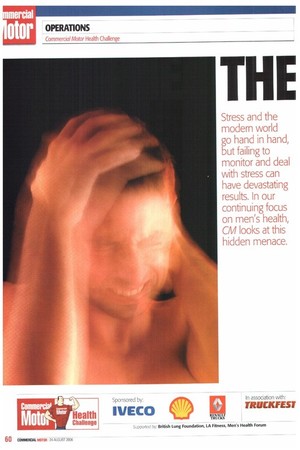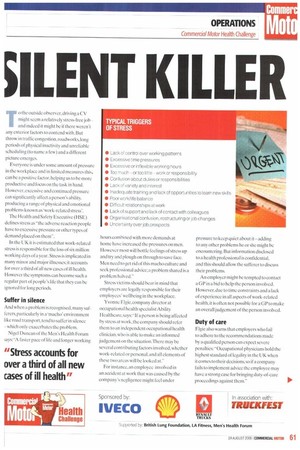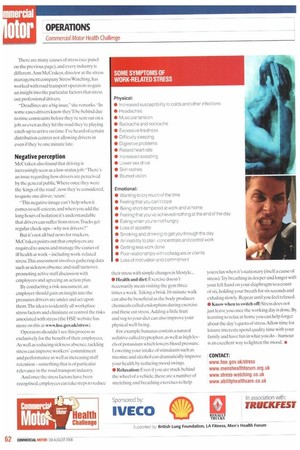THE LENT K LLEIt
Page 60

Page 61

Page 62

If you've noticed an error in this article please click here to report it so we can fix it.
To the outside observer, driving a CV might seem a relatively stress-free job and indeed it might be if there weren't any exterior factors to contend with. But throw in traffic congestion. roadworks. long periods of physical inactivity and unreliable scheduling (to name a few) and a different picture emerges.
Everyone is under some amount of pressure in the workplace and in limited measures this. can be a positive factor, helping us to be more productive and focus on the task in hand. However, excessive and continued pressure can significantly affect a person's ability, producing a range of physical and emotional problems known as 'work-related stress'.
The Health and Safety Executive (HSE) defines stress as"the adverse reaction people have to excessive pressure or other types of demand placed on them".
In the UK it is estimated that work-related stress is responsible for the loss of six million working days of a year. Stress is implicated in many minor and major illnesses: it accounts Ibr over a third of all new cases of ill health. However the symptoms can become such a regular part of people's life that they can be ignored for long periods.
Suffer in silence
And when a problem is recognised, many sufferers, particularly in a 'macho' environment like road transport, tend to suffer in silence which only exacerbates the problem.
Nigel Duncan of the Men's Health Forum says: 'A faster pace of life and longer working hours combined with more demands at home have increased the pressures on men. However most will bottle feelings of stress up and try and plough on through to save face. Men need to get rid of this macho culture and seek professional advice:a problem shared is a problem halved."
Stress victims should hear in mind that employers are legally responsible for their employees' wellbeing in the workplace.
Yvonne Elgie. company director at occupational health specialist Ability Healthcare,says:"If a person is being affected by stress at wc.irk,the company should refer them to an independent occupational health clinician, who is able to make an informed judgement on the situation.There may be several contributing factors involved, whether work-related or personal, and all elements of these two areas will be looked at."
For instance, an employee involved in an accident at work that was caused by the company's negligence might feel under pressure to keep quiet about it -adding to any other problems he or she might be encountering. But information disclosed to a health professional is confidential, and this should allow the sufferer to discuss their problems.
An employer might be tempted to contact a GP in a bid to help the person involved. However, due to time constraints and a lack of experience in all aspects of work-related health, it is often not possible for a GP to make an overall judgement of the person involved.
Duty of care
Elgie also warns that employers who fail to adhere to the recommendations made by a qualified person can expect severe penalties: "Occupational physicians hold the highest standard of legality in the UK when it comes to their decisions, so if a company fails to implement advice the employee may have a strong case for bringing duty-of-care proceedings against them." There are many causes of stress (see panel on the previous page), and every industry is different. Ann McCraken, director at the stress management company Stress Watching, has worked with road transport operators to gain an insight into the particular factors that stress out professional drivers.
"Deadlines are a big issue." she remarks In some cases drivers know they'll be behind due to time constraints before they're sent out on a job. so even as they hit the road they're playing catch-up to arrive on time. I've heard of certain distribution centres not allowing drivers in even if they're one minute late.
Negative perception
McCraken also found that driving is increasingly seen as a low-status job:"There's an issue regarding how drivers are perceived by the general public. Where once they were the 'kings of the road', now they're considered. to quote one driver,'scum'.
This negative image can't help when it comes to self-esteem, and when you add the long hours of isolation it's understandable that drivers can suffer from stress. Trucks get regular check-ups—why not drivers?"
But it's not all had news for truckers. McCraken points out that employers are required to assess and manage the causes of ill health at work — including work-related stress.This assessment involves gathering data such as sickness absence and staff turnover, promoting active staff discussion with employees and agreeing an action plan.
By conducting a risk assessment, an employer should gain an insight into the pressures drivers are under and act upon them.The idea is to identify all work place stress factors and eliminate or control the risks associated with stress (the HSE website has more on this at www.hse.gov.uldstress).
Operators shouldn't see this process as exclusively for the benefit of their employees. As well as reducing sickness absence, tackling stress can improve workers' commitment and performance as well as increasing staff retention—something that is of particular relevance in the road transport industry.
And once the stress factors have been recognised, employees can take steps to reduce their stress with simple changes in lifestyle...
• Health and diet: Exercise doesn't necessarily mean visiting the gym three times a week. Taking a brisk 10-minute walk can also be beneficial as the body produces chemicals called endorphins during exercise and these cut stress. Adding a little fruit and veg to your diet can also improve your physical well-being.
For example bananas contain a natural sedative called tryptophan, as well as high levels of potassium which lowers blood pressure. Lowering your intake of stimulants such as nicotine and alcohol can dramatically improve your health by reducing mood swings.
• Relaxation: Even if you are stuck behind the wheel of a vehicle, there are a number of stretching and breathing exercises to help you relax when it's stationary (itself a cause of stress).Try breathing in deeper and longer with your left hand on your diaphragm to a count of six, holding your breath for six seconds and exhaling slowly. Repeat until you feel relaxed.
• Know when to switch off: Stress does not just leave you once the working day is done. 13) learning to relax at home you can help forget about the day's quota of stress.Allow time for leisure interests. spend quality time with your family and have fun in what you do— humour is an excellent way to lighten the mood. • I CONTACT: www.hse.gov.uk/stress www.mensheallhtorum.org.uk www.stress-walching.co.uk www.abilityhealthcare.co.uk
























































































































































































